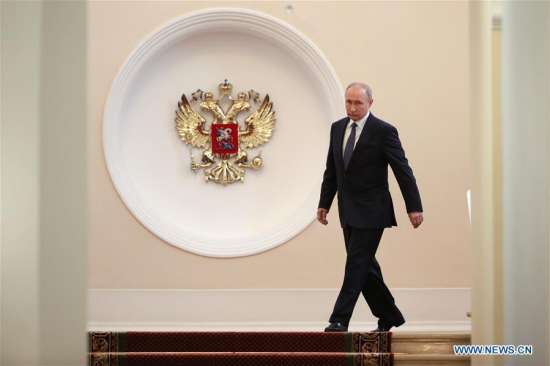
Russian President Vladimir Putin addresses his inauguration ceremony in Moscow, capital of Russia, on May 7, 2018. Vladimir Putin took the oath of office Monday to start his fourth term as Russian president. (Xinhua/Sputnik)
Vladimir Putin took the oath of office Monday to start his fourth term as Russian president, pledging to help build a free society in Russia and promote the country's economic competitiveness and technological development.
"I believe that it is my duty and the meaning of my entire life to do everything for Russia, its present and future, to ensure that it is peaceful and prosperous, to preserve and perpetuate our great people, and bring prosperity to every household in Russia," Putin said in his speech at the inauguration ceremony held in the Kremlin Palace.
He said Russia needs to build a free society. "We need breakthroughs in all areas of life... Such progress can only be achieved by a free society that embraces everything new and advanced, and rejects injustice, stagnation, ignorant protectionism and bureaucratic deadness," he said.
The president said Russia must focus its energy on working out a solution that raises its economic competitiveness and technological development.
Nearly 6,000 people were invited to the inauguration ceremony, including members of the government, deputies and senators, judges of the Constitutional Court, heads of diplomatic missions and representatives of the clergy and youth organizations, according to Interfax news agency.
Following the inauguration ceremony, Putin reviewed the parade of honor guards of the presidential regiment in the Cathedral Square at the Kremlin and, as the head of state and the top commander of military forces in Russia, took over the presidential emergency satchel, also known as the "nuclear briefcase" or "nuclear football," which is part of the automatic system for the command and control of Russia's Strategic Nuclear Forces.
Putin won a landslide victory in the March 18 presidential election with a record 76.67 percent of votes or over 56 million people voting in favor of him.
Despite the record high supporting rate, Putin is faced with great internal and external challenges in his new presidential term, including revitalizing the Russian economy and handling problems with Western countries, experts said.
Echoing Putin's inaugural speech, Azhdar Kurtov, chief editor of the journal "Problems of National Strategy" of the Russian Institute for Strategic Studies, said that Russia needs to catch up with the developed countries in the production of high-tech products and high-value-added products.
"We have reserves and serious achievements in aircraft building, cosmonautics, and weapons systems, but this is not enough for our country to be considered advanced in electronics and other areas. This shows that our economic policy does not create a solid base to ensure a reliable defense capability, among other things," Kurtov said.
Another major uncertainty comes from relations with Western countries, especially the United States, Russia's main geopolitical competitor.
Kurtov warned that Russia will have to face a situation in which significant funds will be spent on strengthening the country's defense capability with Washington resorting to more and more stringent actions against Moscow.
"In the period of Putin's new term, most likely, there will be no significant changes in Russian-U.S. relations. In the near future, Russia and the United States will focus on strategic security issues," said Alexei Mukhin, director general of the Center for Political Information think tank.
Nevertheless, Mukhin said significant changes will occur in other areas, such as strengthening ties and closer cooperation with China, Israel and some European countries.
Later on Monday, Putin signed a decree that sets national development targets up to 2024 in a wide range of spheres, including enhancing economic growth and speeding up technological development.
The Russian government shall achieve the goal of "making the Russian Federation one of the five largest economies in the world" in the period up to 2024, with economic growth higher than the global average and inflation below 4 percent, according to the decree published on the Kremlin's website.


















































